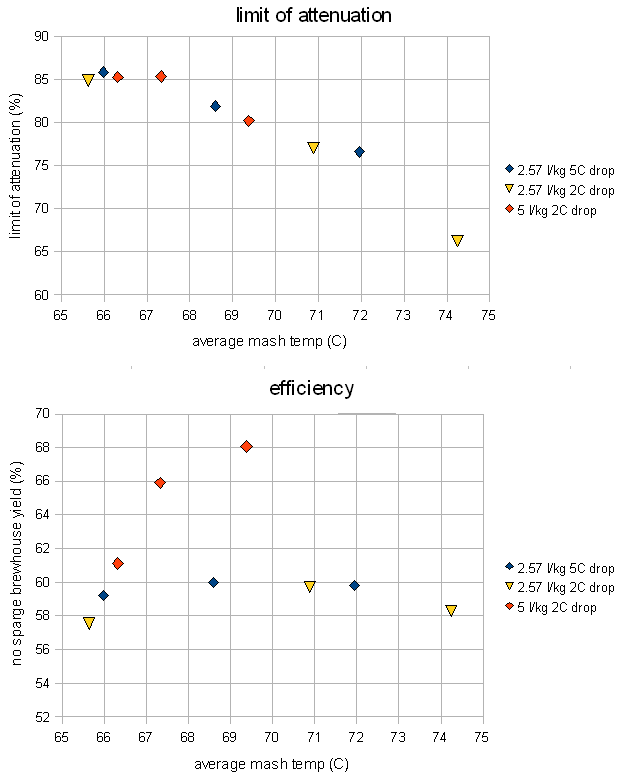I'm 'trying' to learn to do all grain. I started brewing extract about 7 years ago, but I feel like I have no idea what I'm doing based on my results.
I'm trying to make 1 gallon batches so that I can create my own recipes, and not waste a lot of money if the batches don't turn out. I'm using beersmith2 to create my recipes. Great program. Started with 72 percent overall efficiency plugged in. I've made three batches... my efficiency was in the mid 30's to low 40's. I'm at a loss. Beersmith is calculating these beers to be high on the ABV, with my results there's hardly any ABV to be found
I have a 10 gallon water cooler with a large braided hose. With a one gallon batch, the grains don't cover the braided hose. My strike water was 158 and dropped to 138 when I added the grains. About 1.5 qt for 1.5 lb grain. Yes, a little lite, but I added six cups water to bring temp up to 146. Temps were a little low, but this is something I can correct next time. stirred at 15 and 30 mins. Mash for 1 hour. Fly sparged with 158 water per beer smith. Also added 1/8 tsp 5.2 stabilizer at beginning of mash. Took off a total of 1.75 gal at 1.013.
Boiled for 1 hour and ended with just under one gallon. Topped off to one gallon and measured 1.023 OG.
I don't know if I'm missing the mark on mash temperature, or the 10 gallon MT/LT doesn't fit the 1 gallon bill. The grain mill from the HBS looks good from what I've seen online. I have a water softener on city supply. Don't know if that could be a problem. 7.8 PH water is why I used the 5.2 stabilizer after I started mash and measured PH was a little high.
I'm at a loss. I'm reading John Palmers book, six packs from scratch, these forums and google searching. I even made a sweet copper sparge arm/ring to rain in my sparge water. My sparge process was over 30 minutes for 1.75 gallons.


I know someone on here will have some good advice. Thanks in advance.
I'm trying to make 1 gallon batches so that I can create my own recipes, and not waste a lot of money if the batches don't turn out. I'm using beersmith2 to create my recipes. Great program. Started with 72 percent overall efficiency plugged in. I've made three batches... my efficiency was in the mid 30's to low 40's. I'm at a loss. Beersmith is calculating these beers to be high on the ABV, with my results there's hardly any ABV to be found
I have a 10 gallon water cooler with a large braided hose. With a one gallon batch, the grains don't cover the braided hose. My strike water was 158 and dropped to 138 when I added the grains. About 1.5 qt for 1.5 lb grain. Yes, a little lite, but I added six cups water to bring temp up to 146. Temps were a little low, but this is something I can correct next time. stirred at 15 and 30 mins. Mash for 1 hour. Fly sparged with 158 water per beer smith. Also added 1/8 tsp 5.2 stabilizer at beginning of mash. Took off a total of 1.75 gal at 1.013.
Boiled for 1 hour and ended with just under one gallon. Topped off to one gallon and measured 1.023 OG.
I don't know if I'm missing the mark on mash temperature, or the 10 gallon MT/LT doesn't fit the 1 gallon bill. The grain mill from the HBS looks good from what I've seen online. I have a water softener on city supply. Don't know if that could be a problem. 7.8 PH water is why I used the 5.2 stabilizer after I started mash and measured PH was a little high.
I'm at a loss. I'm reading John Palmers book, six packs from scratch, these forums and google searching. I even made a sweet copper sparge arm/ring to rain in my sparge water. My sparge process was over 30 minutes for 1.75 gallons.
I know someone on here will have some good advice. Thanks in advance.
































![Craft A Brew - Safale S-04 Dry Yeast - Fermentis - English Ale Dry Yeast - For English and American Ales and Hard Apple Ciders - Ingredients for Home Brewing - Beer Making Supplies - [1 Pack]](https://m.media-amazon.com/images/I/41fVGNh6JfL._SL500_.jpg)
























![20150409_132011[1].jpg 20150409_132011[1].jpg](https://cdn.homebrewtalk.com/data/attach/228/228960-20150409-132011-1-.jpg)
![20150409_132315[1].jpg 20150409_132315[1].jpg](https://cdn.homebrewtalk.com/data/attach/228/228961-20150409-132315-1-.jpg)
